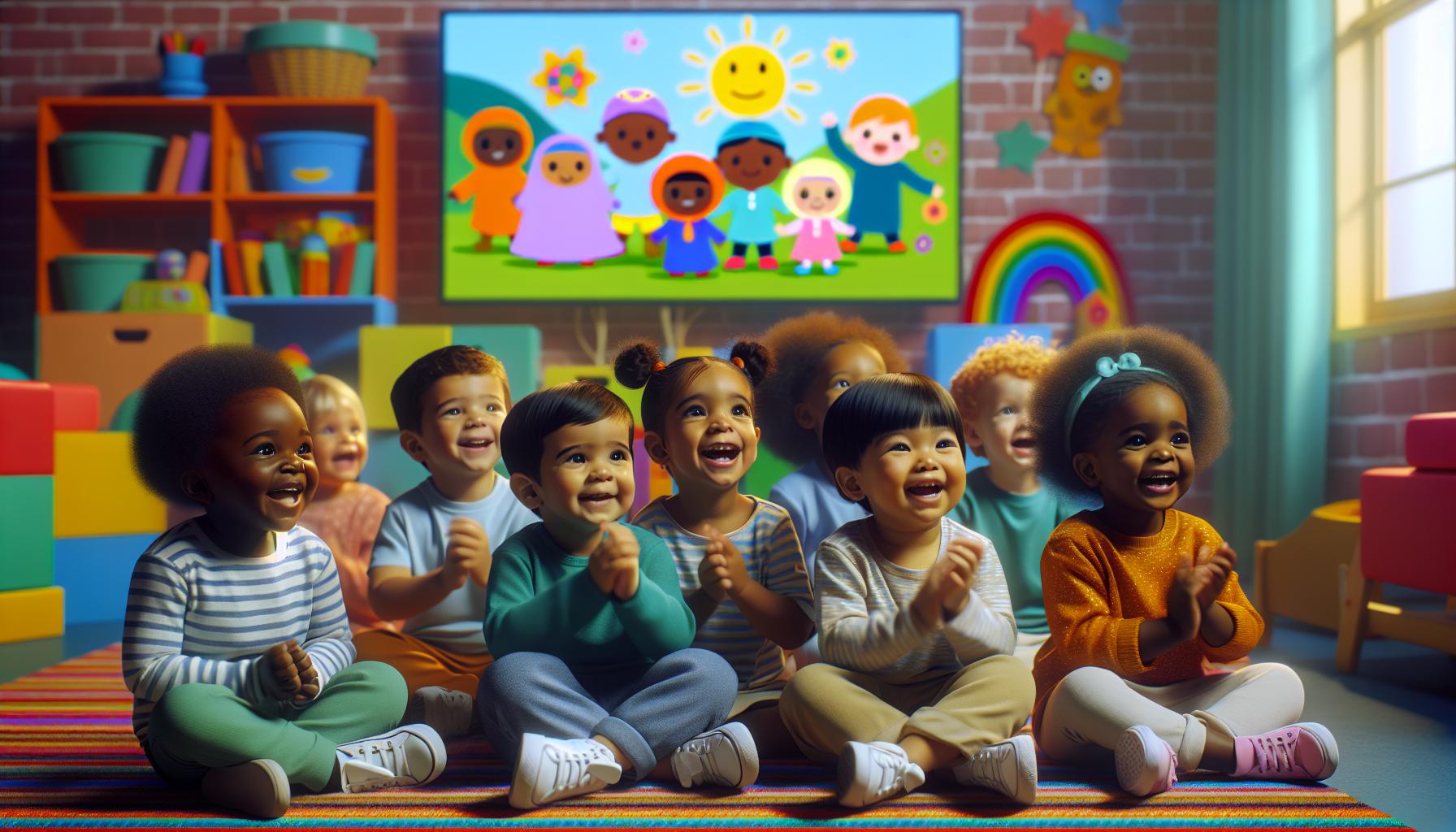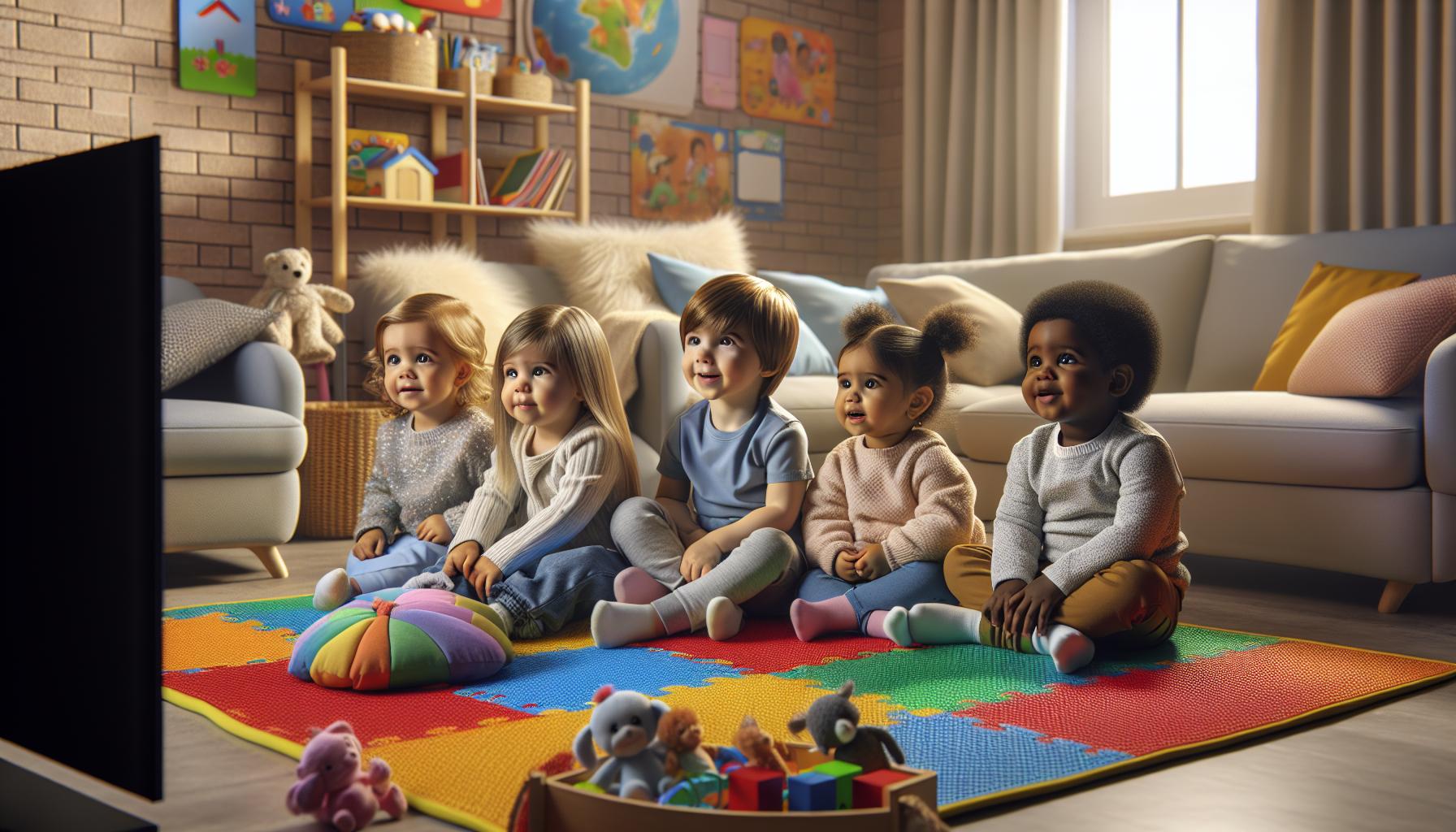Every parent knows the struggle: one minute, their toddler’s babbling away like a tiny philosopher, and the next, it’s all grunts and pointing. It’s a comedic masterpiece that leaves them wondering how to unlock the treasure trove of words just waiting to burst forth. Luckily, there’s a secret weapon in this language-learning journey—TV shows designed to turn those adorable mumbles into full-blown conversations.
Shows to Help Toddlers Talk
Early language development plays a crucial role in a child’s overall growth. Communication forms the foundation for learning and social interaction. Studies show that toddlers who engage with language-rich environments exhibit improved vocabulary skills. Interaction with caregivers enhances language abilities and promotes cognitive skills.
Research indicates that children develop critical listening skills during their first few years. They respond to sounds, tones, and rhythms, which establishes a strong language base. Engaging with TV shows designed for toddlers encourages active listening. Positive role models in these shows motivate language exploration.
Effective language exposure includes varied verbal expressions. Singing songs, reading books, and speaking directly to toddlers enrich their experiences. Each of these methods introduces new words and concepts, fostering curiosity. Interactive dialogue, whether in person or through media, strengthens comprehension.
Parents and caregivers influence language development. Children mimic sounds, words, and phrases, learning through repetition. Consistent practice results in increased confidence in verbal expression. Recognizing this, shows created for young audiences often incorporate engaging storytelling and character interactions.
Emotional connection also enhances language skills. Characters that display feelings and interactions resonate with children. Relating to on-screen experiences encourages toddlers to express their emotions verbally. Furthermore, programs that encourage viewer participation mirror effective language learning strategies.
Promoting early language development sets the stage for future academic success. Building strong language foundations can yield long-term benefits. Encouraging interaction through various mediums ensures toddlers develop essential communication skills.
Recommended Shows To Help Toddlers Talk

Selecting the right shows can significantly enhance a toddler’s ability to communicate. Engaging programming offers valuable resources for fostering early language skills.
Educational Content
Educational shows provide foundational vocabulary and simple phrases. Programs like “Sesame Street” and “Mister Rogers’ Neighborhood” introduce concepts in a relatable manner. Consistent exposure to these shows aids in word recognition and comprehension. Structured lessons wrapped in entertaining formats capture toddlers’ attention and make learning enjoyable. When characters clearly articulate words, children learn pronunciation and context, boosting their verbal skills. Research emphasizes that content rich in vocabulary enhances early language development.
Interactive Features
Interactive shows encourage toddlers to participate actively in learning. Programs such as “Bluey” and “Dora the Explorer” promote viewer engagement through problem-solving and dialogue. Asking toddlers to respond to questions enhances their critical thinking. Singing along with songs or repeating phrases reinforces memory retention. These features create a connection between action and language, fostering verbal exploration. Engaging with characters creates emotional bonds, prompting children to express thoughts and feelings more openly. Active involvement translates to improved communication skills over time.
Overview Of Popular Shows

Several TV shows are designed to help toddlers develop language skills. Each program offers unique features that promote verbal expression and communication.
Show 1: Characteristics And Benefits
“Sesame Street” combines educational content with fun, memorable characters. Legendary for teaching foundational vocabulary, the show uses songs and interactive segments. This approach encourages participation, making learning enjoyable. Research indicates children exposed to “Sesame Street” consistently show improved language abilities. Engaging storylines and consistent repetition foster retention and recognition of common phrases, leading to greater confidence in spoken language.
Show 2: Characteristics And Benefits
“Mister Rogers’ Neighborhood” creates a nurturing environment that enhances emotional and verbal development. The show’s gentle tone and thoughtful discussions boost toddlers’ comfort in expressing feelings. Regular segments introduce new vocabulary and concepts in manageable amounts. Active listening is emphasized as children engage with the content, cultivating their comprehension skills. The show’s timeless approach continues to resonate, strengthening connections between language and emotional intelligence.
Show 3: Characteristics And Benefits
“Bluey” incorporates imaginative play and real-life scenarios, making it relatable for young viewers. The characters often navigate everyday challenges, encouraging dialogue rich in emotion and context. This engaging format stimulates language exploration, inviting toddlers to participate in discussions about feelings and problem-solving. Parents appreciate the show’s focus on family dynamics, which fosters rich communication at home. As a result, children develop critical thinking skills while expanding their verbal repertoire through relatable narratives.
Tips For Parents

Parents can employ various strategies to enhance their toddlers’ language development. Engaging with toddlers during programming can significantly affect their learning experience.
Encouraging Participation
Encouragement leads to active participation when watching shows. Parents can ask questions about characters and plots to spark discussions. Inviting toddlers to sing along with songs fosters verbal engagement. Repeating phrases from the show allows toddlers to practice articulation. Acknowledging their responses promotes confidence and a willingness to communicate. Interactive elements in shows, like physical movements, can motivate toddlers to join in. Making the viewing experience enjoyable encourages children to express their thoughts freely.
Creating a Language-Rich Environment
A language-rich environment supports effective learning. Surrounding toddlers with varied verbal experiences accelerates speech development. Reading daily exposes them to diverse vocabulary and concepts. Singing nursery rhymes strengthens phonemic awareness while building rhythm in speech. Engaging toddlers in conversations promotes turn-taking and active listening. Providing opportunities for play encourages language through role-playing activities. Designing a routine with consistent verbal interactions enhances pacing in language acquisition. Each of these elements contributes to a rich tapestry of learning, fostering essential communication skills.
Enhancing Language Skills
Encouraging toddlers to talk is a vital part of their development. Quality TV shows designed for young children can play a significant role in enhancing language skills. By choosing the right programs parents can create engaging environments that foster communication and emotional connections.
Active participation during viewing can further boost toddlers’ verbal abilities. Parents should remember that the journey to language development is a collaborative effort. Consistent interactions through singing reading and discussing shows can lay a strong foundation for future learning. Prioritizing these experiences will not only enrich language acquisition but also support toddlers in expressing themselves confidently.



